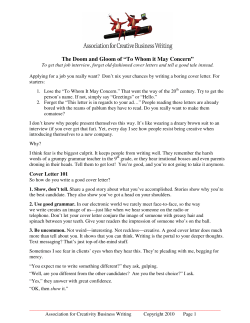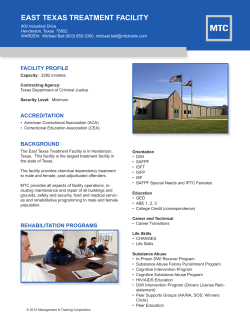
How to Start a LEGO MINDSTORMS Robotics Program for Elementary and
How to Start a LEGO MINDSTORMS Robotics Program for Elementary and Middle School Students Jointly Presented by The University of Texas at San Antonio and Texas Tech University Dr. Can (John) Saygin College of Engineering Interactive Technology Experience Center (iTEC) http://itec.utsa.edu Courtney Pinnell Edward E. Whitacre Jr. College of Engineering http://www.depts.ttu.edu/coe/stem/gear/ Saturday, June 9, 2012 -- 3:00-4:15 pm Henry B. Gonzales Convention Center (Room: 214A), San Antonio Workshop Objectives • To demonstrate the basic operation of Lego® MindStorms NXTTM. • To “briefly” guide you through a hands-on application. • To introduce GEAR (Getting Excited About Robotics) Competition (http://www.gearrobotics.org). Expectations are limited by constraints… We have 75 minutes … “How to Start a LEGO MINDSTORMS Robotics Program for Elementary and Middle School Students” K-12 ASEE Workshop by UTSA and Texas Tech – June 9, 2012 2 • • • • • • • AGENDA Introductions: Tell us about your goals (10 min) Know what is on your thumb-drive (5 min) Intro to NXT and Example 1 (10 min) Example 2 (5 min) What is GEAR? (UTSA Video and Texas Tech prsnt) (10 min) GEAR 2012 (including programming) (25 min) Q & A Session (10 min) Feel Free to Contact Us… Dr. Can (John) Saygin Professor of Mechanical Engineering Director, interactive Technology Experience Center (iTEC) The University of Texas - San Antonio (UTSA) Mechanical Engineering Department One UTSA Circle San Antonio, Texas 78249-0670 can.saygin@utsa.edu Dr. Tanja Karp Associate Professor of Electrical and Computer Engineering TTU Fulbright Program Adviser TTU Society of Women Engineers Faculty Advisor Texas Tech University Lubbock, TX 79409-3102 tanja.karp@ttu.edu “How to Start a LEGO MINDSTORMS Robotics Program for Elementary and Middle School Students” K-12 ASEE Workshop by UTSA and Texas Tech – June 9, 2012 3 Effective Learning HARDWARE NOT GIVEN GIVEN 3 STEP 3 For an 4 STEP 4 Given existing program, design a robot that does what the program is intended for… a “robotic mission”, design a robot, write a program, and improve both if needed… 1 STEP 1 - For an 2 STEP 2 For an existing robot & program, demonstrate what it does and how it does… existing robot and its “mission”, write a program or rewrite program of Step 1... PROGRAM GIVEN PROGRAM NOT GIVEN PROGRAMMING /SOFTWARE “How to Start a LEGO MINDSTORMS Robotics Program for Elementary and Middle School Students” K-12 ASEE Workshop by UTSA and Texas Tech – June 9, 2012 4 Inspire | Teach | Excite | Challenge Introduction to NXT: Overview and Your First Robot The Big Picture Lego Pieces + NXT Brain Sensors Inspire | Teach | Excite | Challenge 6 Introduction • LEGO MINDSTORMS NXT is a robotics toolset that provides endless opportunities for budding inventors, robotics fanatics and LEGO builders ages 10 and older to build and program robots that do what they want. Inspire | Teach | Excite | Challenge 7 Introduction The heart of the system is the NXT brick, an autonomous LEGO microprocessor that can be programmed using a PC. Designers create a program with easy-to-use, yet featurerich software. Inspire | Teach | Excite | Challenge 8 Introduction • Downloading programs to an application is easy. • Users with Bluetooth®-enabled computer hardware can transfer their programs to the NXT wirelessly, or anyone can use the included USB cable to connect their computer to the NXT for program transfer. • The robot then takes on a life of its own, fully autonomous from the computer. Inspire | Teach | Excite | Challenge 9 The Brain Inspire | Teach | Excite | Challenge 10 The Brain • This image of the NXT Brain depicts two series of “holes” These are designed to allow the user to create a “cradle” for the brain. • The standard pegs that come in your NXT kit will fit snugly into these holes. Inspire | Teach | Excite | Challenge 11 Motor Motors are a combination of three items: 1. An electric motor. 2. A position sensing device. 3. A feedback circuit to control the motor. • Motor receives its information from the brain of the robot. • Communication between the motor and the brain is transmitted through an NXT cable. 12 Inspire | Teach | Excite | Challenge Let’s build a basic car! Inspire | Teach | Excite | Challenge 13 “Follow the Line” – single sensor Inspire | Teach | Excite | Challenge 14 Inspire | Teach | Excite | Challenge Line Following With One Light Sensor Attach a light sensor To attach a light sensor to the EduBot, refer to pages 32-33 of the NXT Building Guide (that comes with the Education Kit). Inspire | Teach | Excite | Challenge 16 Edge following or line following? The easiest way to follow a line is to follow the edge, moving on and off the black. Inspire | Teach | Excite | Challenge 17 When on white it needs to go to black. ? When on black it needs to go to white. ? Inspire | Teach | Excite | Challenge 18 . . . And back to black While doing this, it again. edges up the line. Inspire | Teach | Excite | Challenge 19 Basic Line Follow Stops Switch B Forward Left Inspire | Teach | Excite | Challenge 20 Basic Line Follow The Switch block and its configuration panel The trigger point value determines when the sensor is seeing black or white. It is the average between the black % and white %. (Black% + White%) ÷ 2 Inspire | Teach | Excite | Challenge 21 Basic Line Follow A partially completed line-follow program should look like this . . . IMPORTANT Set Move block duration to “Unlimited.” Don’t download yet… What still needs to be added Inspire | Teach | Excite | Challenge 22 Finished Line (Edge) Follow Program Inspire | Teach | Excite | Challenge 23 Educate NXT www.EducateNXT.com Inspire | Teach | Excite | Challenge 24 THANK YOU !!! Inspire | Teach | Excite | Challenge UTSA Engineering & iTEC proudly thank all of our GEAR sponsors !!! GEAR 2012 @ UTSA • 112 teams • 550 students • 112 volunteers (1/team) – welcome, parking, team mgt and staging,… • 800-900 “Fans” on bleachers • 6 Judges (outside playing field support and assessment) • 32 Referees (during games) • Gymnasium, Security/Police, Audio/Video, Parking, Registration, Housekeeping, Food for Volunteers, Setup & take down, … GEAR @ Texas Tech University Courtney Pinnell and Dr. Tanja Karp, Department of Electrical and Computer Engineering Texas Tech University tanja.karp@ttu.edu ASEE K-12 Workshop, June 2012 History: GEAR @ TTU 6 - 8 week LEGO robotics competition for elementary school and middle school students Goal: get students excited about STEM disciplines, learn problem solving skills, design, trouble-shooting, etc. Most schools work on challenge after school or during special class periods No participation fee for schools GEAR competitions at TTU since 2006 50 participating schools, over 180 teams, 500 participants in 2012 www.gearrobotics.org GEAR Hubs: TTU, UTSA, Richardson TTU GEAR Events New Teacher Workshop (January) Kickoff Event: (February, Engineers Week) GEAR Trial Run (March) GEAR Game Day (April, National Robotics Week) GEAR 2012 Activities Development of GEAR 2012 Challenge Collaboration with GEAR Game Design Team and iTEC UTSA Maintenance of energy infrastructure of national energy provider “Energy Incorporated” Robots operate equipment that helps provide fossil and alternative energy for customers Distribution of game mats to all teams in Texas GEAR 2012 Kickoff Event at TTU GEAR 2012 Challenge “Power Up”, Trial Run and Game Day Relationship to Real World Engineering Tasks • Felipe Davila, Halliburton • Dr. Michael Giesselmann, Electrical and Computer Engineering, Texas Tech Oil Spill Clean-up Hands-on Activity Distribution of Game Pieces and LEGO NXT kits ENGR 1315 Students at GEAR Trial Run Key Success Factors Flexibility of implementation at school and hub level Collaboration between teachers and engineering students No participation fee for schools • We provide game pieces and game mats for schools • Schools can check out up to 6 LEGO NXT MINDSTORMS kits Educational opportunities for engineering students • Participation for partial course credit • Service learning projects Promoting engineering (STEM) through role models Shared resources between different robotics programs at TTU Integration of research, teaching, & outreach GEAR Sponsors Pipeline of K-12 Robotics Competitions @ TTU GEAR 1st-8th grade BEST 7th – 12th grade FRC 9th-12th grade
© Copyright 2025













